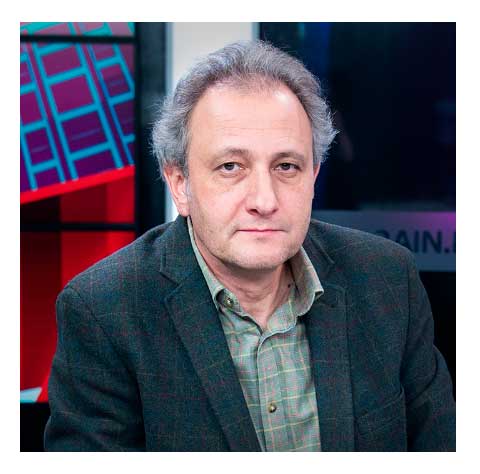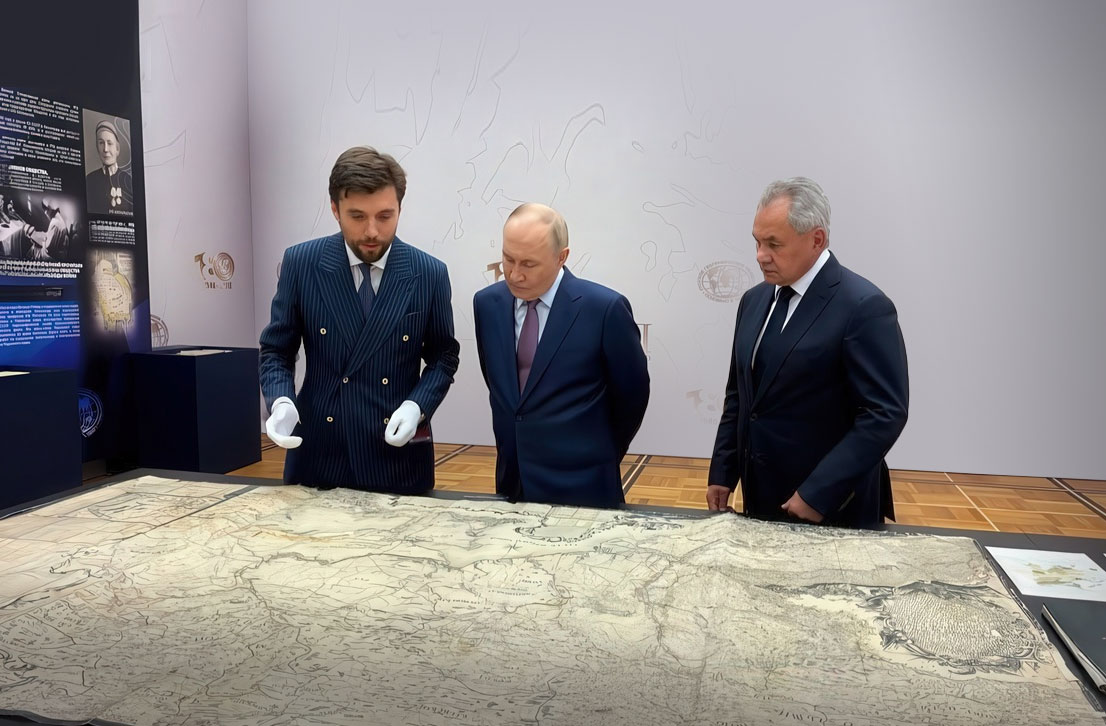“Greetings, Comrade Stalin, we'll be home in a year”
A. Apsolon, “Let the Song Flow in the Open”, 1937
 The era of great geographical discoveries is not over. On the contrary, recent years have rediscovered it, and even the somewhat forgotten concept of “Novorossiya” has returned in the form of an exhibition proposed by the Russian Geographical Society (RGO) for the president's review, called “100 Reliable Facts about Novorossiya”. Although, of course, one should look at the subject more broadly and present something like a globe of Russia in accordance with Tyutchev's poem “Russian Geography” to the RGO meeting and the reelection of its head Shoigu: “From the Volga to the Euphrates, from the Ganges to the Danube... Here is the Russian kingdom”. By the way, as the president reported, a unified geography textbook will soon appear so that the trembling hand of a child will no longer hesitate where to place Russia's borders on the outline map “from the Ganges to the Danube”.
The era of great geographical discoveries is not over. On the contrary, recent years have rediscovered it, and even the somewhat forgotten concept of “Novorossiya” has returned in the form of an exhibition proposed by the Russian Geographical Society (RGO) for the president's review, called “100 Reliable Facts about Novorossiya”. Although, of course, one should look at the subject more broadly and present something like a globe of Russia in accordance with Tyutchev's poem “Russian Geography” to the RGO meeting and the reelection of its head Shoigu: “From the Volga to the Euphrates, from the Ganges to the Danube... Here is the Russian kingdom”. By the way, as the president reported, a unified geography textbook will soon appear so that the trembling hand of a child will no longer hesitate where to place Russia's borders on the outline map “from the Ganges to the Danube”.
The Anglo-Saxon Harrington's Conspiracy
After the RGO meeting, Putin answered journalists' questions about US sanctions and “Tomahawks” and in the heat of the moment confused the direction of export-import operations, lamenting the restrictions on the export of sovereign Russian toilets (if such exist in nature), while the issue was, on the contrary, about restricting the supply of these products from the West. (Anyone who stood in the hopeless queue in front of the “Plumbing” store during the golden Soviet times knows how tragic the consequences can be; however, although toilets will become golden in price, parallel imports will save from shortages.) But this is all the cunning of the Anglo-Saxons, for it is known that the object alien to Russian traditional values named water closet was invented by the British court poet John Harrington at the turn of the 16th-17th centuries, among other things, the author of the famous poetic lines: “A rebellion cannot end in success, otherwise it is called something else”. Shouldn't the Kremlin inhabitants remember this, if within walking distance from the decision-making center on Varvarka Street there is an impressive people's memorial dedicated to the late Kremlin “cook”.
In the course of implementing new geographical discoveries at the RGO meeting, traditionally great attention was paid to Russia's advancement in the Arctic. After all, the Arctic myth was at the core of the ideology of restored greatness and rising from knees. Back in 2007, polar explorer Artur Chilingarov lowered the Russian flag to the bottom of the Arctic Ocean near the North Pole, marking the territory. In 2010, Sergey Ivanov, then Deputy Prime Minister, actively argued that the Lomonosov Ridge is a direct continuation of Siberia. It was assumed that there are immense hydrocarbon riches, which, however, a decade and a half later in light of sanctions and the drop in oil and gas revenues from the budget is not such important knowledge. If Comrade Stalin had known how the energy balance would turn out, he might not have fought so fiercely for the coal of Spitsbergen in his time.

Vladimir Putin and Sergey Shoigu during a visit to the Russian Geographical Society's project exhibition study maps from the times of the Russian Empire, October 23, 2025. Photo: RIA / Kremlin Pool
Sovereign AI and Living Space
Putin, however, maintains continuity, in strict accordance with the imperial-colonizer pathos of the 1937 hit “Let the Song Flow” by composer Pushkov and lyricist Apsolon, drowning out the onset of the Great Terror with its bravado: “The order of the Land of Soviets is to conquer the polar darkness and to hoist the Soviet flag in the distant North.”
The Kremlin's attention to the RGO, always emphasized as keen, is not due to a normal nostalgic teenage interest in geography (in my school years I was simply obsessed with geography, maps, geographical puzzles by Zakhar Zagadka, as well as Mayne Reid and Jules Verne), but because this science becomes an instrument of imperial policy, ideology, and propaganda. The task of Putin's geography is to secure the empire's borders and to educate the youth in the imperial spirit, which is quite openly stated: 2027 should become the Year of Geography with “the consolidation of maps—new maps”, as the President of the Russian Federation said. And to ensure all this remains in the global mind, artificial intelligence must be trained in our manner:
“...Attention to the RGO's funds should be paid by companies engaged in the development and training of artificial intelligence. Only relying on our culture, history, linguistic wealth, traditions, and traditional values, can we create truly sovereign models of artificial intelligence, rather than copying foreign solutions, which leads to both technological and ideological dependence, and ultimately to the loss of sovereignty...»
That is, for the whole world, it, this very AI, will be one for all, and for us—our own, homespun, and homemade. This is the meaning of Putin's policy in general—to separate from the world, to establish our own “sovereign” rules in contrast to the global ones, “established by who knows whom”. Geography will also be our own, once and uniformly established. As Shoigu noted in an interview with TASS, dedicated to his reelection as the head of the globe of Russia, it should rid the youth of the “sense of guilt” for certain circumstances of Russian geography and history. This sounds especially piquant when recalling the senseless megalomaniac projects that Stalin never realized even with the use of slave labor of GULAG prisoners—due to irrationality and uselessness even in the administrative economy. Shoigu, who is certainly glad to switch from SVO to something more positive, has many plans. For example, a project that would be envied by both Soviet planners and security forces, who resettled human resources (mostly forcibly), and socialist utopians:
“...A global idea is needed. I propose to launch a project with the working title “Places for Life”. It will allow us, based on new factual data, to show ideal points for human settlement in the regions of Russia...»
This problem should be solved by “expeditionary activity”—isn't it currently taking place within what is called a “special operation”?
Shoigu has long been a supporter of large-scale projects in the same Siberia. But, as with Stalin, perhaps it will not be possible to implement them without “bourgeois specialists” and foreign engineers. For this, Trump is needed, which is well known to another supporter of megalomania, Kirill Dmitriev.
According to his giant interview with state media, Shoigu blames everything on perestroika. As does Putin—on the 1990s, which he reiterated on the same day when geographical discoveries were supplemented by demographic ones at the meeting of the Council for the Implementation of State Demographic and Family Policy.
Related plots: Shoigu's planned constructions and new places of resettlement... that is, the resettlement of peoples requires the physical presence of people. Preferably unpretentious, that is, from large families, which, excluding the families of mini-, midi-, and maxi-oligarchs and top officials, are extremely poor and dependent (which the state needs from the point of view of ease of management). Putin still believes that the demographic pit of the 1990s is due to the nature of the transformations taking place at that time. And indeed, as insiders say, in today's HSE, frequent mention of the demographic classic Anatoly Grigorievich Vishnevsky is not welcomed (although how to remove his name from the title of the HSE Institute of Demography?). He, in fact, explained the nature of the phenomenon:
“...Let's take, for example, the emergence of natural population decline in the early 90s. It is often explained by the shock of Gaidar's reforms, the harmful effects of the “turbulent 90s”, etc. But this is a completely incorrect explanation... By the early 90s, the non-warring generations, born in 1927 and subsequent years, when birth rates in Russia were still high, began to reach the age of 60, they were more numerous, accordingly, the number of deaths was also large—after all, it is mainly elderly people who die. And the number of births was affected by the second echo of the war: the low number of births during the war years first reminded of itself with a small number of potential mothers a quarter of a century later, in the late 1960s, and the second time—another quarter of a century later, in the early 90s...»
Round Dances in Kokoshniks
But in the same speech, Putin insisted on another demographic discovery:
“...Of course, internal value orientations (to increase birth rates. — A. K.) are much stronger and more important. Did peasant families in Russia live at the level of average European income, or what? No, and there were seven to ten people in the family. Value orientations are completely different, worldview ones—this is what lies at the core and should lie at the core of demographic policy...»
Here, value orientations attributed exclusively to the Russian people are confused with the historical period (of all countries without exception) before the demographic transition, sanitary and contraceptive revolutions. Yes, yes, revolutions are not only “colorful”. Habits of washing and using the invention of the aforementioned John Harrington, implying the presence of sewers and water supply; urbanization; the increase in the number of educated people, even with an average income; the use of contraceptive means and the increase in the value of human life—all these achievements initially predominantly of Western civilization were gradually introduced into the daily life of different peoples. Russia belatedly integrated into the demographic transition and including the contraceptive revolution and conscious management by a person of their reproductive behavior, but still integrated. Now state policy is pulling somewhere into the period before the demographic transition, and its ideologists like Dugin even propose returning to almost a primitive state.
To lead round dances in kokoshniks in honor of recruits sent to the army, recruited to expand the spatial characteristics of Russian geography—is this the ideal? Isn't there something archaic in it...
The story with geography and demography, as well as with specific sovereign historical science, continues. The rejection of world heritage in favor of specially invented sovereign is costly for the country and its human capital. And when sovereign AI appears, natural universal human intelligence risks suffering an almost irreversible defeat.
* Andrey Kolesnikov is considered a “foreign agent” by the Ministry of Justice of the Russian Federation.